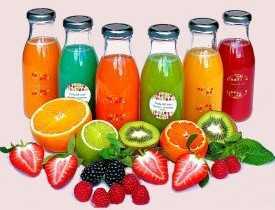Description
Course Name: Certificate in Drinking Beverages & Juices
Course Id: CDBJ/Q1001.
Eligibility: 10th Grade(High School) or Equivalent.
Duration: One Month.
Objective: The objective of this course is to equip learners with the knowledge and skills required for the production, processing, packaging, and marketing of drinking beverages and fruit juices. The course covers raw material selection, formulation, quality control, hygiene standards, and business management to enable participants to establish or operate efficient beverage and juice processing units.






Debit/Credit Card, Wallet, Paytm, Net Banking, UPI, or Google Pay.



• A soft copy (scanned) of your certificate via email within 7 days of examination.
• A hard copy (original with official seal and signature) sent to your address within 45 day of declaration of result.

Online Examination Detail:
Duration- 60 minutes.
No. of Questions- 30. (Multiple Choice Questions).
Maximum Marks- 100, Passing Marks- 40%.
There is no negative marking in this module.
| Marking System: | ||||||
| S.No. | No. of Questions | Marks Each Question | Total Marks | |||
| 1 | 10 | 5 | 50 | |||
| 2 | 5 | 4 | 20 | |||
| 3 | 5 | 3 | 15 | |||
| 4 | 5 | 2 | 10 | |||
| 5 | 5 | 1 | 5 | |||
| 30 | 100 | |||||
| How Students will be Graded: | ||||||
| S.No. | Marks | Grade | ||||
| 1 | 91-100 | O (Outstanding) | ||||
| 2 | 81-90 | A+ (Excellent) | ||||
| 3 | 71-80 | A (Very Good) | ||||
| 4 | 61-70 | B (Good) | ||||
| 5 | 51-60 | C (Average) | ||||
| 6 | 40-50 | P (Pass) | ||||
| 7 | 0-40 | F (Fail) | ||||







Syllabus
Introduction to Beverage Industry: Overview of the beverage sector, Classification of beverages (carbonated, non-carbonated, natural juices, flavored water), Market trends and growth potential, Role of beverages in the food industry, Major players and brands in the beverage sector, Regulatory framework and standards (FSSAI, BIS), Importance of hygiene and safety, Career opportunities in the beverage industry, Consumer preferences and behavior, Sustainability practices in beverage production.
Raw Materials and Ingredients: Types of fruits and vegetables used, Water quality standards and treatment, Sweeteners (natural and artificial), Flavoring agents and enhancers, Preservatives and stabilizers, Nutritional additives (vitamins, minerals), Emulsifiers and colorants, Acids and pH regulators, Seasonal sourcing and procurement, Storage and handling of raw materials.
Juice Extraction and Processing: Juice extraction methods (manual, mechanical, cold press), Fruit and vegetable washing and sorting, Pulping and clarification, Filtration and homogenization, Pasteurization and sterilization, Concentration and dehydration, Blending and flavor adjustment, De-aeration and fortification, Minimizing nutrient loss, Traditional vs modern processing technologies.
Beverage Formulation and Development: Concept development and prototyping, Nutritional value balancing, Taste testing and sensory evaluation, pH and Brix level control, Color and appearance optimization, Shelf life extension techniques, Stabilization and emulsion techniques, Product innovation (herbal, energy drinks, functional drinks), Legal and labeling considerations, Cost-effective formulation strategies.
Packaging and Labeling: Types of packaging (PET bottles, glass, Tetra Pak, cans), Selection of appropriate packaging material, Role of packaging in preservation, Labeling requirements and nutritional info, Barcode and batch coding, Design and branding elements, Packaging automation and machinery, Environmental impact and recyclable packaging, Packaging testing and validation, Compliance with regulatory norms.
Quality Assurance and Control: Good Manufacturing Practices (GMP), Hazard Analysis and Critical Control Points (HACCP), Microbiological and chemical testing, Sampling procedures and lab techniques, Record keeping and traceability, Equipment calibration and maintenance, Allergen and contamination control, Sensory quality assessment, Shelf life testing and validation, Internal and third-party audits.
After successful completion of the Certificate in Drinking Beverages & Juices program, graduates gain skills in production, quality control, packaging, and marketing of beverages such as fruit juices, soft drinks, and other non-alcoholic drinks. The beverage industry in India is rapidly expanding, fueled by growing consumer demand for healthy and convenient drink options.
✅ Career Options After Certificate in Drinking Beverages & Juices – India
| Job Role | Job Description | Average Salary Range (per annum) |
|---|---|---|
| Production Supervisor | Manages daily beverage production, ensuring quality and efficiency in manufacturing processes. | ₹2.5 – ₹5.0 Lakh |
| Quality Control Analyst | Tests raw materials and finished beverage products for quality, safety, and compliance standards. | ₹2.5 – ₹4.5 Lakh |
| Packaging Coordinator | Oversees beverage packaging, labeling, and storage operations to maintain product integrity. | ₹2.0 – ₹4.0 Lakh |
| Sales & Marketing Executive | Promotes and sells beverages to wholesalers, retailers, and distributors. | ₹2.5 – ₹5.5 Lakh + incentives |
| Machine Operator (Beverage Production) | Operates machinery involved in juice extraction, mixing, filling, and sealing. | ₹1.8 – ₹3.5 Lakh |
| Entrepreneur – Beverage Production | Starts a small or medium-scale business producing packaged juices, soft drinks, or flavored beverages. | ₹6 – ₹25+ Lakh (profit-dependent) |
| Research & Development Assistant | Supports formulation improvements and development of new beverage products. | ₹3.0 – ₹6.0 Lakh |
| Food Safety Officer | Ensures adherence to food safety laws and standards (FSSAI) in beverage production and packaging. | ₹3.0 – ₹6.0 Lakh |
🥤 Industries Hiring Graduates
-
Juice processing and bottling companies
-
Soft drink manufacturers
-
Packaged beverage startups
-
Food and beverage quality labs
-
Retail and wholesale beverage distributors
-
Exporters of processed beverages
💼 Entrepreneurial Opportunities
Graduates can:
-
Launch small-scale juice extraction and packaging units producing fresh fruit juices, flavored drinks, or energy beverages.
-
Develop and market health-focused and natural beverage brands.
-
Provide contract manufacturing services to local beverage brands.
-
Innovate with new flavors and functional beverages targeting niche markets.
💰 Earnings Potential:
-
Small juice business: ₹30,000 – ₹1 lakh/month profit
-
Medium-scale beverage brand: ₹8 – ₹30+ Lakh per annum

